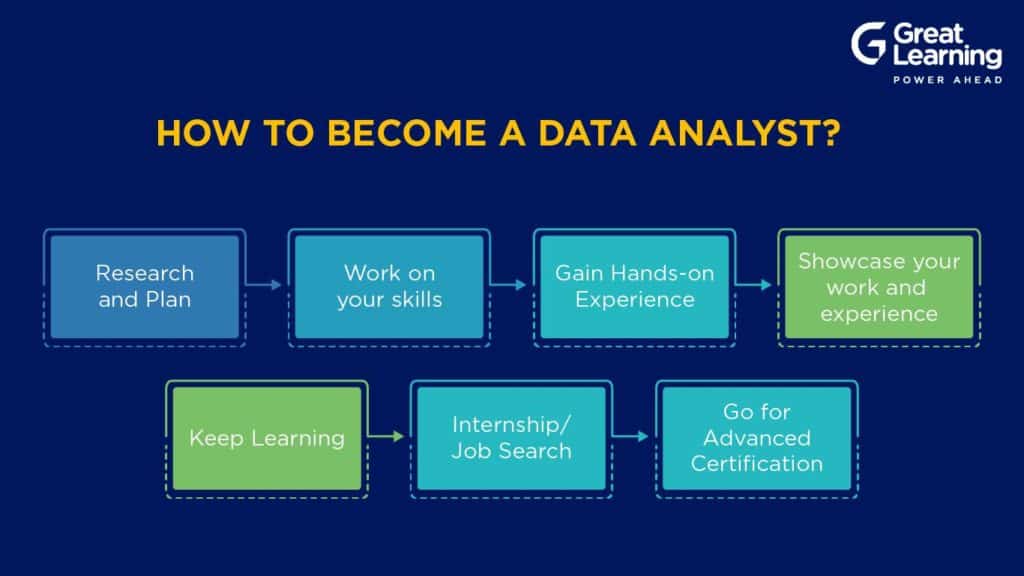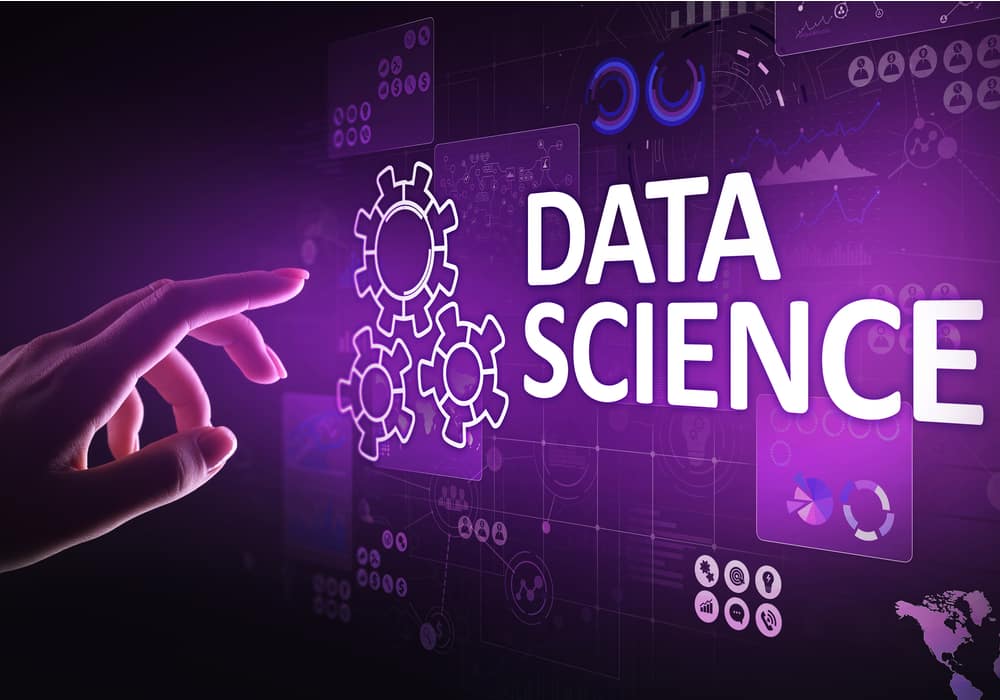- Who is a Data Analyst?
- Data Analyst Job Description: Roles and Responsibilities
- What does a data analyst do?
- Data Analyst Skills - Key Skills required to be a Data Analyst
- Data Analyst Qualifications and Training requirements
- How to Become a Data Analyst?
- What are the Education Requirements of a Data Analyst?
- Data Analyst Job Roles and Salaries
- Major Companies Hiring Data Analysts
Data has changed the world over the last decade and is now like a gold mine in this modern world. While many may choose to ignore the importance of data, data volumes have been exploding. Do you know in 2020 – every person, generated 1.7 megabytes in just a second? (source)
The Internet users alone generate around 2.5 quintillion bytes of data each day. Netflix saves $1 billion per year on customer retention by using big data. Quite astonishing right!?
This is where the world is today. All businesses ranging from small MSMEs to MNCs and Fortune 500 companies use data primarily to understand their market/customers and derive meaningful insights. This is where data analysts play a major role. Data analysts analyze data and interpret information with actionable insights that help individuals and businesses to make crucial decisions.
Data analysis has become one of the top tending and highest in-demand jobs worldwide. Experienced data analysts are also given good salaries and perks which paves a great career path in the field of Data Science and Analytics.
Who is a Data Analyst?
A data analyst is someone who can turn raw data into actionable business insights with the help of his analytical skills and data analysis tools. They also play a major role in forecasting trends and analyzing future market scenarios.
If you are someone who loves problem-solving, has a knack for mathematics, and is fuelled by curiosity to analyse data to reap profits for your organization, this career of a data analyst can be your calling.
Why do I say that?
Because, as a data analyst, you will help companies optimize their strategies by collecting data and fetching insights from it. You’ll be processing various data catering to customers, products, and the company’s performance to help in real-time decision making. As you dig deep into the process of scrutinizing information, you’ll also use data analysis tools.
If you want to learn more specifically about data science, opt for The Post Graduate Program in Data Science & Business Analytics. The PGP DSBA Course is specially designed for working professionals for career assistance.
Fill this form and understand more about this program.
Let us take a look at the detailed data analyst job description below
Data Analyst Job Description: Roles and Responsibilities
What does a data analyst do?
A data analyst collects, processes and analyzes large datasets to get actionable business insights. They use the insights to answer questions and solve problems.
Rapidly advancing technology and the development of the languages like SQL have made it easy to retrieve data from databases. The knowledge of MS Excel and SQL are two things that every data analyst should have in their arsenal.
Apart from analyzing data, you’ll also be removing corrupt data, performing analysis to assess the quality and then determining the meaning of data, and preparing reports based on analysis for the company’s top-level management.
Here is a sample job description for your reference
Here are some of the important roles and responsibilities of a data analyst:
- Using data analyst tools to extract data from data sources
- Removing corrupt or wrong data
- Performing quality analysis on data
- Developing and managing databases
- Creating database systems and processes for data management
- Filtering data basis requirements from various stakeholders
- Using data analysis and statistical tools to analyze data and forecast trends with actionable business insights
- Preparing comprehensive reports basis analyzed data forecasting trends and predictions
- Working with other team members from technical, product, engineering, and operation teams to stay on top of data management processes/systems
- Managing Exploratory Data Analysis Projects and identifying patterns
- Thorough understanding and experience in MS Excel including VBA and Marcos
- Proficiency in statistical tools like SPSS, SAS, and other tools basis project requirements
Quick Check – Data Analyst Career Path
Data Analyst Skills – Key Skills required to be a Data Analyst
Various technical and soft skills are required to be a data analyst. Basis the analysis from job search sites like LinkedIn, Indeed, and many others; here is a list of few skills:
- Good analytical thinking skills
- High attention to detail
- Excellent mathematical knowledge and skills
- Having a strategical and logical approach to problem-solving
- Written and verbal communication skills
- Ability to work collaboratively with the team
- Good research skills
- Ability to analyze and interpret data
- Proficiency in:
- Microsoft Excel
- Microsoft Word
- Microsoft Powerpoint
- Tableau
- SAS
- SPSS
- Oracle
- Microsoft Power BI
In addition to these, languages such as SQL, Python, R are great add-ons to a data analyst’s profile.
Data Analyst Qualifications and Training requirements
A thorough understanding and knowledge of softwares or tools for data analysis alone is not enough. To become a good data analyst, one needs to have good mathematical, critical thinking, and analytical skills. Generally, a Bachelor’s degree in Mathematics, Computer Science, Economics, or Statistics gives you a significant edge to kick-start your career as a data analyst. However, amidst the pandemic, PG programs in data science and business analytics also give you a major boost and make you industry-ready.
How to Become a Data Analyst?
If you are new or have less knowledge about this role, here is a quick practical step-by-step guide on How to Become a Data Analyst?

- Research and Plan
- Work on your skills
- Gain Hands-on Experience
- Showcase your work/experience
- Keep Learning
- Internship/Job Search
- Go for Advanced Certification
1. Research and Plan
The first thing which we recommend you is to research the data analyst role and the data science industry. This research will help you understand where you stand and how you need to get started! It is vital to develop some foundational knowledge in this field.
E.g. Go through a course curriculum of data science and a job description of a data analyst on an excellent learning blog to understand in detail.
2. Work on your skills
Once you have done the basic research, you know the skills you have vs what you need to learn to kick-start the journey of becoming a data analyst. Here focus on the technical skills mainly.
Basis the job description analysis you have done, start learning these by prioritizing the important ones.
3. Gain Hands-on Experience
Now that you have essential skills and an idea of the roles/responsibilities of a data analyst, you must get hands-on experience. One such way is to work on projects with deadlines. This can be done online by taking up any free project-based courses available or by approaching freelancers via LinkedIn and getting involved with them on the project they are working on.
Another way is to start working on data that is openly available. For example, you can go to the Barclays Premier League website, and you will get the data of the past month and year of all the goals scored and various statistics for each team and the players of each team. Start collecting this data and analysis. You can write a blog about the findings, post it on your social media and add it to your portfolio too.
You can do this for weather reports and climate data, which will also be available on various websites.
4. Showcase your work/experience
Create a portfolio to showcase all the work you have done. Use images/graphics and statistics to show your work. Nowadays, having a simple WordPress website is also a great pitch when you apply for a job or an internship.
5. Keep Learning
Well, this is a never-ending process. Once you start getting hands-on experience, do not settle there. Yes, you have an essential portfolio, but you must upgrade to the next level. Start working on more advanced projects. You can learn on YouTube and other learning platforms. Joining groups on Telegram and LinkedIn to stay updated and build your network.
6. Internship/Job Search
Create an ATS-compliant resume and start applying for relevant internship and job roles once your portfolio is ready. Always read the job description in detail before applying for any job. This will help you to not only choose the proper role but also help you prepare accordingly. You can use it on sites like – LinkedIn, Naukri, Indeed, .etc.
7. Go for Advanced Certification
Going for an advanced certification course or a PG program will help you immensely in Career Progression and pick-up skills. Check out our Data Science Programs here.
1. PGP – Data Science and Business Analytics
2. Data Science Online Course with Gen AI
What are the Education Requirements of a Data Analyst?
To become a data analyst, you need a combination of technical and soft skills. In terms of technical skills as a data analyst, you should have complete knowledge in at least one of the programming languages. The more languages you know, the better. Some of the popular programming languages used by data analysts are Python, R, SQL, Java, PHP, etc. You also need to acquaint yourself with the fundamentals of data analysis and its tools. As discussed above, to be a data analyst, you should be comfortable with mathematics, statistics, and also know how to use charts, tables, and graphs.
Once you have attained a fine understanding of these, you need to gain hands-on experience with project handling, statistical programming, data cleaning, and data visualization. In addition to these core technical skills, you also need the ability to analyse and interpret data, an ability to plan work meticulously and meet deadlines. Because you’ll be connecting with multiple teams, you should also have sound interpersonal skills, oral and written communication and the ability to work with a team.
In a nutshell, data analysts are good at working with numbers and analysing details. So if you are looking forward to becoming a data analyst, start NOW!
Data Analyst Job Roles and Salaries
Adept data analysts are in demand in almost every sector. It is considered to be one of the most popular careers, so you should learn data science as early as you can in your career.
There is a large variety of data analysts jobs you can get as you strengthen your data handling skills. Listed here are some of the job roles you can take as you become a data analyst:
- Sales Analysts
Being a sales analyst, you will focus on analyzing the organization’s sales activities regularly. This will include analysing the volume of sales along with the overall sales pipeline.
- Marketing Analysts
Their key area of focus is towards the different marketing channels that exist in the organization to find key strengths and weaknesses.
- Product Analysts
Their job involves around a specific product and determining the aspects of the product that are expected from the company which also includes suggesting the product pricing.
- Business Analysts
They work with their organisations to improve their processes and systems by conducting research and analysis to address business problems.
- Budget Analysts
A budget analyst reviews the organization’s budget and looks for new ways to increase profits and improve efficiency. They are the ones who allocate funds among different departments.
- Corporate Strategy Analysts
They analyze the organization’s broader corporate strategy to make recommendations for guiding key decisions. They are also involved in mergers and acquisitions.
There are various data analyst job roles available in the analytics industry. Here are a few of the top data analyst job roles with salaries for both India and the USA:
| Job Role | Average Salary in USA per annum in USD | Average Salary in India per annum in INR |
| Data Analyst | $41,600 – $93,600 | ₹3,00,000 – ₹12,00,000 |
| Analytics Manager | $78,000 – $1,50,000 | ₹9,00,000 – ₹31,00,000 |
| Business analyst | $50,000 – $97,200 | ₹3,00,000 – ₹15,00,000 |
| Data Engineer | $65,000 – $1,40,000 | ₹4,00,000 – ₹19,00,000 |
| Data Manager | $41,600 – $1,44,000 | ₹3,00,000 – ₹30,00,000 |
| Data Architect | $80,200 – $1,70,000 | ₹11,00,000 – ₹34,00,000 |
| Database administrator | $48,000 – $1,20,000 | ₹3,00,000 – ₹15,00,000 |
| Research Scientist | $60,000 – $1,60,000 | ₹4,00,000 – ₹28,00,000 |
| Research Analyst | $41,600 – $85,000 | ₹2,00,000 – ₹9,00,000 |
| Statistician | $55,000 – $1,28,000 | ₹3,00,000 – ₹19,00,000 |
These are approximate ranges and the salaries will vary depending on the years of experience, organization, skill, location, and various other factors. The above data is obtained from LinkedIn Salary Checker for the USA and from Glassdoor for India.
Major Companies Hiring Data Analysts
There are various types of organisations in diverse industries a data analyst can work for. Consulting firms, Financial services firms, E-commerce companies, pharmaceutical companies, Marketing companies, NGOs, and companies from various other sectors hire data analysts.
A few top companies are IBM, TCS, Wipro, Infosys, Deloitte, Mckinsey and Company, KPMG, EY, Target, Flipkart, Amazon, Intel.
Quick Read: How to become a data analyst – A step-by-step guide









